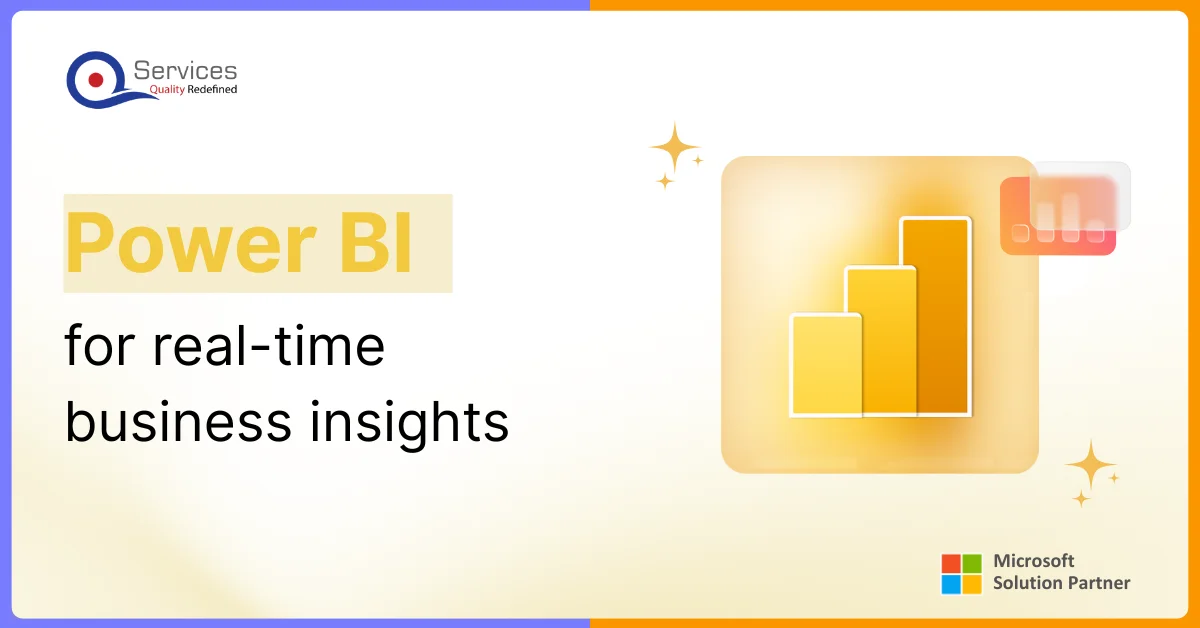
Home » How Business Intelligence for Data Drives Strategic Decisions ?

 Business Intelligence (BI ) is a technology- driven process that involves collecting, managing, and analysing data for businesses to provide actionable insights for better decision-making. By collecting, managing, and analysing data, businesses can gain a deeper understanding of their operations, spot trends, and make informed decisions. BI tools help transform raw data into meaningful information, which is crucial for strategic planning and staying competitive.
Business Intelligence (BI ) is a technology- driven process that involves collecting, managing, and analysing data for businesses to provide actionable insights for better decision-making. By collecting, managing, and analysing data, businesses can gain a deeper understanding of their operations, spot trends, and make informed decisions. BI tools help transform raw data into meaningful information, which is crucial for strategic planning and staying competitive.
Get free Consultation and let us know your project idea to turn into an amazing digital product.
Businesses analyze a variety of data to make informed decisions and improve their operations. Here’s a comprehensive look at the types of data they typically collect:
They always look at Sales data to track revenue trends, product performance, and market demand, which helps them understand what’s selling and where to focus their efforts.
Customer data like demographics, purchase history, and preferences is crucial for tailoring marketing strategies and boosting customer satisfaction.
Operational data such as inventory levels, supply chain efficiency, and employee productivity helps in streamlining processes and cutting costs.
Lastly, financial data covering profit margins, expenses, and investment performance is essential for managing the company’s financial health.
When it comes to the best business Intelligence Solutions, Power BI is a standout choice. It is powerful and super user friendly, making it easier for businesses to dive into data analysis. Power BI lets businesses to connect to a variety of data sources, so that they can pull in all information need for a comprehensive outlook.
This tool enables businesses to facilitate real-time reporting. Its interactive dashboards and customizable charts allow users to easily visualize complex data and extract actionable insights.
Plus, it’s scalable, meaning it grows with your business, handling more data as you expand. Security is also a big plus point of Power BI, with features like data encryption and user access controls keeping businesses information safe.
Business Intelligence is a powerful tool that transforms raw data into meaningful data insights that helps companies to make informed decisions. Here’s a comprehensive look at how BI achieves this transformation through data.
First up, BI tools collect data from different places like from websites, databases and even IoT devices. It’s like collecting information from various stores and then putting them all together in one place. This way, businesses get a complete picture of all their data in one place.
Example: Consider a retail store that collects data from its physical stores, online shop and customer service calls. By combining all this data, they can see how customers are shopping and what products are popular in the market.
Once the data is gathered, the next step is to analyse and visualize the data. BI tools advanced analytics techniques, such as data mining and predictive analytics helps businesses to identify trends and relationships within the data.
These meaningful data insights are then presented through data visualizations such as interactive dashboards, graphs, charts and maps. Visualization helps complex data more accessible and understandable, allowing users to quickly grasp key insights and make informed decisions.
The same retail company uses BI to visualize sales data across different regions. Interactive dashboards show which products are performing well in specific areas, helping the company tailor its marketing strategies and inventory management.
Generating actionable insights in the BI process is the last and most crucial step. Through this process businesses analyses both the historical and real-time data. These BI tools provide them information they need to make insightful decisions and take immediate action. These insights can help companies identify inefficiencies, adapt to market shifts, correct supply chain issues, and improve customer satisfaction.
The retail company identifies that certain products are consistently out of stock in specific regions. Using BI insights, they adjust their supply chain strategy to ensure better stock availability, improving customer satisfaction and increasing sales.
Business Intelligence is a game changer for companies looking to make strategic decisions for their growth. We will discuss here how it really helps with some practical examples.
BI tools analyse huge amounts of data to understand patterns that might not be immediately obvious. This helps them to predict the future opportunities and potential threats occurrence.
Let’s consider a financial services firm that uses BI to analyse economic indicators and market data. By identifying trends in consumer spending and investment patterns, they can develop new financial products that meet emerging customer needs, giving them a competitive edge.
BI helps to streamline business operations by providing insights into different business processes. By analysing performance data, they can identify ineffectiveness, leading to cost savings and increased productivity.
Like a manufacturing company uses BI tool to monitor performance of a production line. By analysing data on machine downtime, production rates, and defect rates, they can identify bottlenecks and implement process improvements, resulting in higher efficiency and lower operational costs.
Understanding customer behaviour and choices is important for maintaining high levels of satisfaction and retention. BI tools analyse customer data to provide meaningful insights that help businesses tailor their products and services to better meet customer needs.
A telecommunications company uses BI to analyse customer service interactions and usage patterns. By identifying common issues and preferences, they can improve their service offerings and customer support, leading to higher customer retention.

In day-to-day business operations, BI can be utilized in various ways to support insightful decision-making:
BI tools are able to analyze employee performance data which helps businesses to identify training needs, improve workforce planning, and enhance employee engagement.
To analyse supply chain data, Supply chain management businesses can easily optimize their inventory levels, significantly reduces lead times, and improve supplier relationships.
BI helps in analyzing campaign performance, customer segmentation, and market trends, enabling more effective and targeted marketing strategies.
Example: A mid-sized tech company uses BI to track the performance of its marketing campaigns. By analyzing data on customer engagement, conversion rates, and ROI, they can refine their marketing strategies to better target their audience and maximize their marketing budget.
Business Intelligence is considered as the ultimate game changer for Businesses which helps them to take insightful decisions to boost customer satisfaction. By adopting BI tools, businesses can make quicker decisions and improve operational efficiency. If you’re curious about how BI can transform your business, it’s worth exploring the various solutions out there. Start with a BI consultation to see how BI can specifically benefit your organization and give you that competitive edge.
To explore more about business growth, Visit: “How Azure Data Analytics Drives Business Growth”

Our Articles are a precise collection of research and work done throughout our projects as well as our expert Foresight for the upcoming Changes in the IT Industry. We are a premier software and mobile application development firm, catering specifically to small and medium-sized businesses (SMBs). As a Microsoft Certified company, we offer a suite of services encompassing Software and Mobile Application Development, Microsoft Azure, Dynamics 365 CRM, and Microsoft PowerAutomate. Our team, comprising 90 skilled professionals, is dedicated to driving digital and app innovation, ensuring our clients receive top-tier, tailor-made solutions that align with their unique business needs.

In 2026, it’s vital for every developer to be skilled in using the right set of Azure developer tools for cloud projects. Microsoft’s Azure cloud platform is at the center of this shift, providing a wide range of solutions for building and managing apps. With cloud development with Azure, teams can launch reliable apps that scale globally and respond to business needs in real time. Picking the right items from the Azure tools list can save time, money, and help you get better results.

Azure Cosmos DB is a robust, globally distributed, multi-model database service that can manage enormous volumes of data with minimal latency for a variety of contemporary applications.

In this blog, we focus on the key components of a full-stack application and discuss strategies and tools for implementing effective monitoring and logging in Azure.
To take decisions based on data rather than by intuition is what data driven called for. This approach helps businesses to make accurate predictions for maintaining a culture of accountability and continuous improvement.
BI provides valuable insights to businesses by analysing data from various sources. This helps business leaders to make informed decisions leading to great customer experience and scalability.
Data quality is crucial for effective BI because low quality data can lead to bad decisions. High-quality data ensures that the analysis is reliable, which in turn helps businesses make better strategic choices and avoid costly mistakes.
BI tools analyze large volumes of data to spot patterns and trends in the market. Helping businesses to strive by identifying emerging trends, understanding customer preferences, and adapting their strategies accordingly.
BI enhances CRM by providing detailed insights into customer behavior and preferences. This allows businesses to personalize their interactions, improve customer satisfaction, and build stronger relationships. BI can also help identify potential issues before they escalate, ensuring a better customer experience.
Data governance ensures that the data used in BI is accurate, consistent, and secure. It involves setting policies and procedures for data management, which helps in maintaining data quality and compliance, making BI insights more reliable.
Implementing BI can be tricky due to high costs, data integration issues, and the need for skilled staff. There’s also the challenge of getting everyone on board with using new tools and processes. But with proper planning and support, these hurdles can be overcome.
BI tools analyze large amounts of data to spot patterns and trends in the market. This helps businesses keep ahead by understanding what customers want, predicting future demands, and adjusting their strategies to meet market changes.
BI helps in resource allocation by providing insights into where resources are being used efficiently and where they are not. This allows businesses to optimize their operations, cut costs, and ensure that resources are directed towards the most impactful areas.

Founder and CEO

Chief Sales Officer
